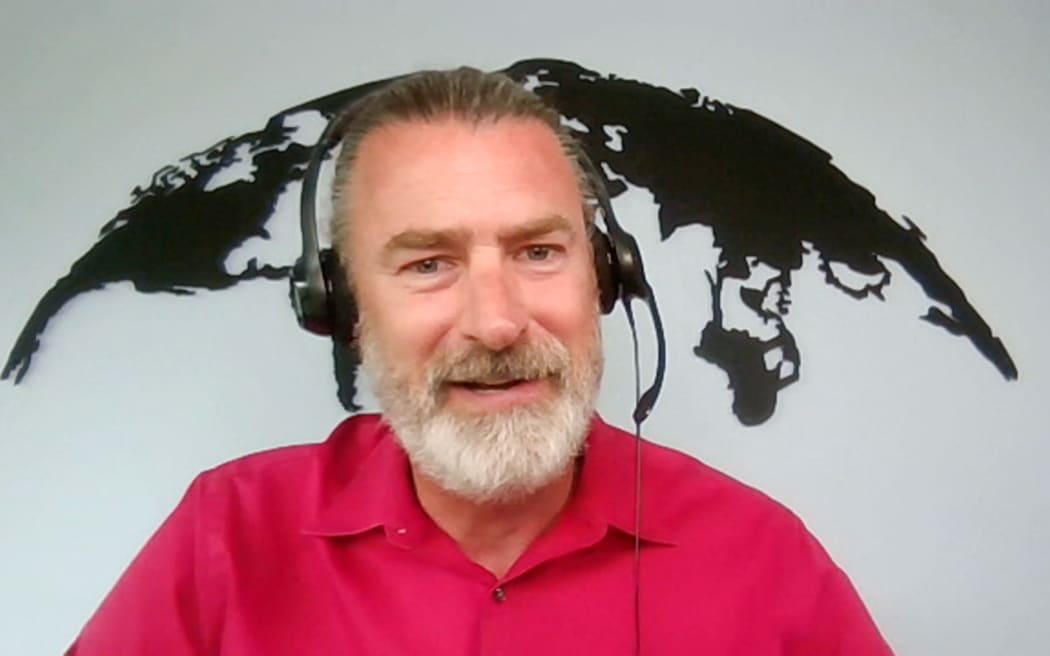China is in trouble - and New Zealand should look to Japan for a way out of its reliance on it, a geopolitical expert says.
"No one is in a worse position than the Chinese," Peter Zeihan, a top geo-political strategist, says.
"According to the data that the Chinese have updated in just the last year... they've got a fertility rate that is one quarter, or below, replacement levels in all of their major cities.
"So, we're looking at the demographic collapse of the Chinese state within 10 years, and that assumes nothing else goes wrong - no trade war with the United States, no government breakdown because of the cult of personality that has arisen around chairman Xi [Jinping], no conflict, nothing."
Zeihan's dramatic predictions are in the latest episode of RNZ's multimedia programme, 30 with Guyon Espiner.
The implication of China's collapse as a viable global economic power, according to Zeihan, is huge losses to New Zealand's export market.
Follow Japan - how NZ can make it, according to Peter Zeihan
Zeihan is the author of New York Times bestseller The End of the World is Just Beginning.
He has warned that globalisation as we know it is in its twilight years, with the US becoming increasingly isolationist and pulling back from its post-war role in policing global trades routes.
New Zealand's "two-pillar" approach to keeping up relationships with both China and the US is fraught, he says.
"It doesn't serve your economic interest. It definitely doesn't serve your cultural, or your strategic interests."
READ MORE
- New Zealand Forges Deeper Ties with NATO
- US leads international military exercise to sink old warship
- Indefensible New Zealand - Podcast
- MPs demand inquiry into foreign interference amid Chinese Premier's visit
Over decades of diplomacy culminating in a free trade agreement, China has become New Zealand's largest trading partner buying more than $21.b in exports including dairy, meat and wood products each year. Few countries have achieved the diplomatic ties with China that New Zealand has won.
New Zealand has also pursued an independent foreign policy for several decades, most notably via a nuclear-free policy that is supported by most Kiwis despite the discord it has created with the US.

Peter Zeihan was a guest on 30 with Guyon Espiner. Photo: RNZ
But Zeihan suggests New Zealand needs to re-assess all of that. It needs to start preparing for a future when relying on the Chinese economy is no longer an option, and follow Japan's example by holding its nose and cosying up to the US.
"Under the previous government of Shinzo Abe, we basically had the Japanese come to the United States, say flat out, '[we] can't go it alone,' and came up with an absolutely humiliating trade deal that gave in to Washington on each and everything that had ever been an irritant in the relationship.
"It worked. And Japan is now part of the American inner circle of allies.
"New Zealand, if they want to be part of this network, is going to have to do something similar."
The US, he says, due its geographic position, security and self-sufficient energy production, doesn't rely on globalisation for survival in the same way most of the world currently does.
"The United States is the world's premier power not because of globalisation.
"When you live on a farm, kids are free labour, but when you move into a condo in a city, kids are an expense.
"If you remove the NAFTA [North American Free Trade Agreement] states from the equation, we trade for about 3 - maybe 3 and a half - percent of our GDP."
To bolster its chances of survival, Zeihan believes New Zealand must be prepared to acquiesce more to US demands in terms of free-trade agreements, and actively pursue inclusion in sensitive security arrangements with Western allies, like the AUKUS pact.
"And it's far, far smarter to start that process before the old system has collapsed, because [when you have no choice] the price would be much higher."
* 30 with Guyon Espiner comes out every week on RNZ, YouTube, TVNZ+ and wherever you get your podcasts.
The curse of a comfortable life?
While its demographic crisis appears to be pointed, China isn't the only country facing the problem - it's affecting much of the developed world, including New Zealand.
"As we all globalised, we also industrialised and urbanised," Zeihan says.
"When you live on a farm, kids are free labour, but when you move into a condo in a city, kids are an expense.
"And so, we went from having four to five, to six [children] on average, to now less than one and-a-half in most parts of the advanced world.
"You play that forward for 75 years and in most countries there's not even a theoretical possibility of repopulation."
Without the replacement numbers to maintain the flow of commerce, countries that rely heavily on global trade will find things a lot tougher in the coming years.
"We're all going to have to adjust a lot. And for countries that are major food importers, some of these adjustments are going to be incredibly painful."
When it comes to food security, however, Zeihan says New Zealand is in a better position than most.
"New Zealand is nearly unique in the world and the products you've chosen to specialise in are the products that you have the lowest input costs for.
"In the case of dairy, for example, you don't have a hard winter, you don't have a hard summer and you have sufficient rain that most of your dairy doesn't have to be fed fodder.
"You've got all the pieces in place that can survive the globalisation collapse.
"Your biggest concern is going to be access to manufacturing goods in a post-China world."



